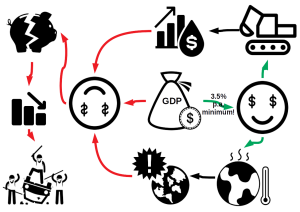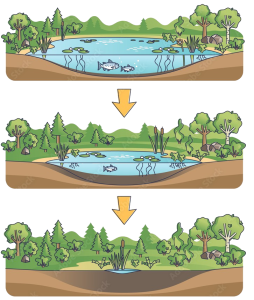czyli Samozaoranie Kapitalizmu
Każda prawdziwie radykalna osoba marzy o rewolucji. Najlepiej światowej, najlepiej postępowej i najlepiej udanej. Różnimy się jedynie w ocenie ilości krwi, jaką trzeba rozlać, aby rewolucja się udała, i – nawet bardziej – w wyobrażeniach o tym, jak świat ma wyglądać dzień po.
Przerwa na nastrojową muzykę…

To nasze kolektywne marzenie trwa już dość długo, czasem prawie w zasięgu ręki, czasem tuż za horyzontem. I tak trwałoby dalej, gdyby kapitalizm nie wziął sprawy we własne ręce…
Gadanie dziadów z brodami
Teza o tym, że kapitalizm musi upaść pod ciężarem własnych nierozwiązalnych sprzeczności ma wielu ojców (i zapewne matek). Do niedawna interpretowano ją przede wszystkim w sensie ekonomicznym (wyczerpania zasobów do zagarnięcia) i społecznym (narastanie napięć społecznych aż do ogólnego wybuchu).

Od niedawna obserwujemy jednak jeszcze jedno zjawisko – wyczerpywanie się pojemności ekologicznej planety. Do naszego języka weszły już na stałe pojęcia kryzysu ekologicznego, surowcowego czy klimatycznego, których synergię można określić jako wszechkryzys. Jest też jasno widoczne, jaki wpływ ma połączenie monetarnej bazy kapitalizmu – pieniądza kredytowego – z uzależnieniem od surowców (nie tylko paliw) kopalnych.
Sposobem kapitalizmu na kryzysy była zawsze ucieczka do przodu – doprowadzona do logicznego szczytu w formie globalizacji, i ekstrapolowana nadal pod postacią różnych doktryn ekspansji transplanetarnej czy też transhumanistycznej. Jednak przełomu wciąż nie ma, a zasoby do niego niezbędne kurczą się nieustępliwie. Może być tak, że właścicielom świata uda się o włos wymknąć zagładzie, czy to na Księżyc, na orbitę, do pasa planetoid czy na Marsa, ale wtedy prawdopodobieństwo przetrwania kapitalizmu na Ziemi znacznie zmaleje, a na pewno jego popularność spadnie do zera.
Marks, Lenin i inni prorocy upadku kapitalizmu nie przypuszczali zapewne, że taki może być jego koniec. My – jeszcze parę lat temu – też raczej nie.
Ekologia polityczna kapitalizmu
Historycznie, ekspresją kapitalizmu jest konkretny typ organizacji społecznej i infrastruktury, zwany cywilizacją przemysłową. Jak pisze profesor Jem Bendell w książce „Breaking Together”
Takie społeczeństwa opierają się na masowej produkcji dóbr konsumpcyjnych w procesach przemysłowych, zarówno w danym kraju, jak i importowanych. Jak opiszę dalej […], większość ludzi na świecie żyje obecnie w przemysłowym społeczeństwie konsumpcyjnym lub jest częściowo zależna od jego produktów i usług. Kluczowym aspektem takich społeczeństw jest to, że potrzebują one masowej konsumpcji, aby nadal rosnąć, aby były stabilne, tak jak rower potrzebuje rozpędu, aby pozostać w pozycji pionowej.
Oprócz oczywistych ograniczeń w postaci skończonej ilości poszczególnych zasobów materialnych, mamy teraz do czynienia z ograniczeniami strukturalnymi, które wpływają na „układ nerwowy” i „krwionośny” kapitalizmu, a więc na dynamikę władzy politycznej i logistykę. Zmiany w tych obszarach wynikają zarówno z wydarzeń fizycznych (różnego rodzaju katastrofy uszkadzające i ograniczające działanie infrastruktury), jak i ze zmian politycznych antycypujących postępy załamania.

Szukając spójnego ujęcia tych procesów, znajdziemy je w pojęciu sukcesji ekologicznej. Organizmy (biocenoza) zasiedlające pewien obszar (biotop) tworzą względnie stabilny ekosystem. Jego stabilności zagrażają jednak zarówno czynniki zewnętrzne, jak i wewnętrzne.
Dziejący się upadek wynika z czynników wewnętrznych (w skali planetarnej): cywilizacja przemysłowa na tyle przekształciła własny ekosystem, że przestał być on przyjazny dla życia w ogóle, a dla tej cywilizacji w szczególności.
To, co postrzegamy jako upadek, destrukcję i kolejne wielkie wymieranie, jest więc – z punktu widzenia planety – przejściem do nowego ekosystemu. Mieszkańcy poprzedniego mają do wyboru migrację, wymarcie lub adaptację.
Innej rewolucji nie będzie
Cytując znów Bendella:
Ludzie pragnący zmienić społeczeństwo próbowali polityki, zarówno lokalnej, krajowej, jak i międzynarodowej. Próbowali zwiększyć bazę wiedzy na temat problemów. Próbowali podnieść świadomość w społeczeństwie. Próbowali wykorzystać potęgę technologii, biznesu i finansów. Próbowali żyć inaczej. Ale nic z tego nie zadziałało na dużą skalę.
Ponieważ systemy współczesnego społeczeństwa były tak odporne na te taktyki przez dziesięciolecia, gdyby nie upadały teraz, nie byłoby szans na żadną realną zmianę.

Zaiste, kapitalizm sam sobie zgotował rewolucję, a nam dał szansę podjęcia budowy nowego społeczeństwa na gruzach starego. To my zbudowaliśmy świat, który przywłaszczyli sobie kapitaliści i ich służalcy. To my zbudujemy kolejny – z pozostałości poprzedniego. Ruiny nam nie straszne.


Z perspektywy ekofeministycznej i rdzennej można mówić o wyczerpującej się formule, która dominowała przez ostatnie stulecia. To nie jest tylko kapitalizm. Można ją określić jako przemysłowa Nowoczesność. Przez Nowoczesność rozumiem tu realizację w praktyce założeń Modernizmu. Prawdopodobnie kończy się nie tylko kapitalizm, ale marzenia o „w pełni zautomatyzowanym luksusowym socjalizmie” 😉 warto o tym pamiętać. Ku uciesze załączam realizację filmową czegoś o czym mówi J.M. Greer i John Howard Kunstler – happy motoring bez benzyny: https://www.youtube.com/watch?v=WhhONtKnao0
Absolutnie. Bendell wręcz używa pojęcia Imperial Modernity i wskazuje jej oparcie na fikcji postępu i pieniądza kredytowego.
Możliwość komentowania została wyłączona.